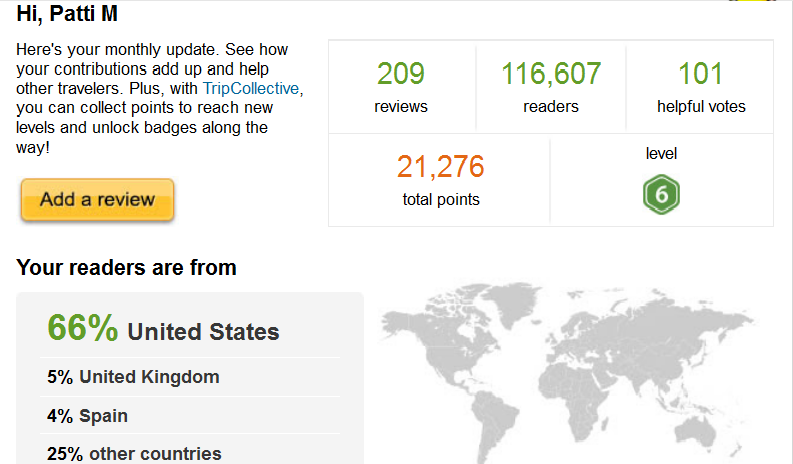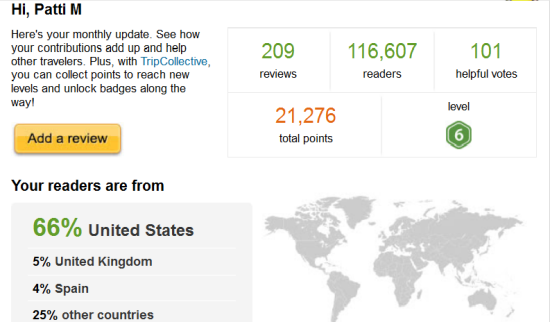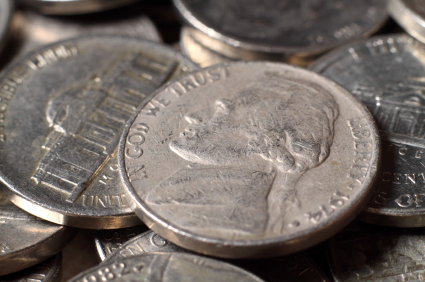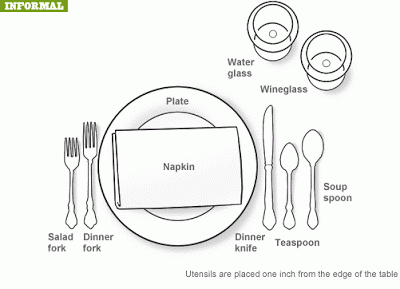
I caught the gist of the phrase based on what I was hearing on the news, but I have to admit I still went to everyone’s back-up source and Googled the term.
Here’s the definition of a non-disparagement clause:
“A provision in a contract requiring one or more parties to the agreement not to make negative statements about the other(s). A non-disparagement clause is often included in a settlement agreement that resolves a dispute.” Nolo.com
Pandora’s Box
Seems straightforward enough. Got a beef with us, keep it to yourself. However, what’s making the news is that companies are striking back when someone posts a negative review, say on the company’s website, Google, Yelp or TripAdvisor. It goes a little something like this… You didn’t like our delivery service so you wrote a negative review bashing us and now we’re going to sue you because you didn’t adhere to the non-disparagement clause. Yikes! Talk about opening Pandora’s Box!
Trip Advisor
I’m a big fan of TripAdvisor. I know there is a lot of negative talk out there about TripAdvisor but it’s our go to source when traveling, or even when we’re looking for a local business. When we owned our Bed and Breakfast, we booked a lot of guests based on our reviews on TripAdvisor. We had a business account with the company so I had a live representative I could talk to. In nearly 4 years we were only approached once – from a shady source – to post reviews for bucks. I reported the company to TripAdvisor and the site was taken down. But I’m guessing they just popped up under another name. From our experience, TripAdvisor is working to keep it real. And what I especially appreciate about TripAdvisor is that they post reviews as they come in with no preferential postings. The good, the bad, the ugly, one after another. It’s a fair system.
Not a Fan of Yelp
Yelp, on the other hand, not so much. I hate Yelp’s algorithm. Years ago while working in my former career I had a rare opportunity to talk with a live person at Yelp. Here’s how it works. If I’m a top reviewer and I’m constantly posting reviews on Yelp, my reviews will stay in the forefront. If you come along and post one random review, you’ll get lost at the end of the line. Plus, Yelp, will hide reviews they do not recommend. It’s a bit tricky, you have to find the link to open “not recommended reviews.” Personally, I think the reader should be the one to decide if the reviews are worth reading. Anyway… Not a fan of Yelp.
Reviews
When we’re reading reviews, our system is to add together the number of average, poor and terrible reviews, if it totals more than the combined total of very good and excellent reviews, we move on. We have found a multitude of great places based on TripAdvisor reviews, but the key point to remember is that it’s impossible to please everyone, so it’s usually a good idea to toss the outlier reviews.
Non-disparagement Clause
So, here’s what I’m thinking. How is the non-disparagement clause going to come in to play when it comes to hospitality and travel industries? Think about it. Hotels, B&B’s, restaurants, tour companies, tourist attractions, etc., etc., What? Every time a business gets a bad review they’re going to sue?! Are hotels going to have a disparagement clause in the fine print of their registration form? Actually, now that I think about it, is it there already? Um… yes:
“Internet shames New York hotel into removing non-disparagement clause fining wedding couple for their guests’ reviews”
I’ve posted 209 reviews on TripAdvisor under our One Road at a Time logo. With our background in hospitality, I think we have a pretty good perspective on which to base our reviews. And, I try to write them as informative and detailed as possible. Out of those 209, I think I’ve only posted 2 terrible reviews and believe me, they were well-earned. So far, I haven’t been sued. But there is one guest house owner in Spain that was not at all happy with the “average” review I posted.

The Right to Sue
Think about all of the potential reviews written in daily life for dentists, doctors, contractors, retail, banking and of course the travel and hospitality industries. Once Pandora’s Box is open, where would it end? And how would companies such as Yelp and TripAdvisor, a multi-billion dollar company, deal with such a fall out? Their very existence is based on reviews.
Does a company have the right to sue the negative reviewer? I think that will be determined by the courts, but in the mean time does it all boil down to what our mothers taught us? If you can’t say something nice, don’t say anything at all.













I stand by the principle that truth is the defense for libel or slander accusations. But I don’t write many reviews for TripAdvisor or any others, just because I’m not very generous with my time. If something is really extraordinary and I think the establishment can use help spreading the word, I’ll write it up. If something is horribly wrong, I tend to write directly to management instead of publishing it on TripAdvisor. As a consumer, I remember that each experience is unique. I even disagree with some of my own reviews upon a second visit!
Kristin Henning recently posted…Jaume Marin Fires Up Costa Brava
Wise words to live by, Kristin.
Great topic! In the law of libel and slander, truth is a defense to a libel or slander law suit. As a recovering lawyer, I’m curious as to how these “disparagement” lawsuits by businesses have been treated in court. (However, as much as I’m tempted to dive in and research this question, I am resisting so I can continue to consider myself in recovery). In a settlement, I can understand non-disparagement clauses—both sides have agreed to give up something to get something. I doubt these clauses can be hidden in settlement agreements. I take that back. In some cases, a company will try to get to a victim before they consult a lawyer, so they can get a desperate person who needs money for medical bills to give up their right to sue in exchange for some figure set by the company.
I always use TripAdvisor when picking a restaurant or hotel. I don’t do a strict average. I read more than a few reviews to get a sense of where they are falling, but also to see what real people are saying. For example, if someone marks down a restaurant because they do not use top shelf alcohol in their drinks, that’s not a deal breaker for Mr. and Mrs. Excitement if the food is good. After a stay at the Cavas Wine Lodge in Mendoza, Argentina, mine was one of a string of glowing reviews. Then I saw one that only gave the place 2 stars. I was curious to see what this person found fault with. It turns out her complaint was that the owner was a phony because she was nice to everybody. (Really?) I’m not sure I like the idea of Yelp curating reviews for me based on their criteria, but when using TripAdvisor, I do look to see how many reviews a person has done. If there’s an outlier terrible or excellent review (compared to the other reviews) and that person has only ever posted one review, my spam antenna shoots up.
As a lawyer, I always tell people to read all of any document they sign. In real life, if I arrive at a hotel after an all night flight and there are other people behind me waiting to check in, I’m most likely going to plop down my John Hancock at the “x” without reading a thing. 😉

Suzanne Fluhr recently posted…Zentangle Diva Challenge #243 – Less is Enough Edition
Agreed. When you’re exhausted or distracted you’ll just sign on the dotted line and of course that’s exactly what some businesses are hoping you’ll do. It’s going to be interesting to see how this all plays out.
I’ve never been a fan of online reviews, people’s taste differ too much and vendetta reviews or businesses asking friends for reviews is getting all too much.
As my mother always said, if you have nothing good to say, don’t say anything at all. And that’s something we’ve adhered to in our blogging as well. If we really can’t find anything good to say about a place or business, we just won’t write about it. Especially when it comes to small businesses because we know it could cost someone their livelihood.
All valid points, Nathalie, there are so many ways to think about the subject. And there are definitely personal opinions and/or as you say, vendetta reviews. The very reason why we toss the outliers and have a tendency to average out what we’re reading.
Tough one. Say something nice or don’t say anything is a good credo. However, then TripAdvisor, Yelp, and other review sites are then not authentic, right?

Charles McCool recently posted…8 Great Captivating Travel Instagrammers to Follow
Exactly! If businesses want the positive feedback they have to be willing to deal with the negative feedback in an appropriate fashion without law suits! How about a good old-fashioned apology and an offer to do better?!
Like you, I am a big fan of Trip Advisor. Too many of us have forgotten what it was like in the pre-Trip Advisor days when tourism providers could say what they liked in glossy advertising, knowing that once they got your money it didn’t matter how crappy their service was there was nothing you could do about it. Trip Advisor has levelled the playing field a little. If what you say about non-disparagment clauses is correct it is very unfortunate.

Lyn aka TheTravellingLindfields recently posted…Raymond Island, Victoria
That’s a valid point, Lyn, thanks for reminding us about the benefits of reviews!
Yeah, that’s a really interesting post. So can we sue these companies for misleading us? I smelled a con a few years back when posting a review for OpenTable. You know that their paying clients are the restaurants? (who pay a commission to Open Table based on reservations made to their restaurant on the OT website). So I had found it strange that my negative review of a restaurant was never posted. So who are they protecting and who are they promoting?

Good to know about Yelp.
I’m also a fan of Trip Advisor and if you look at the general score given an establishment they are usually right. Yes, you may get some cranky lady who complains about lack of turndown service or about the person at reception not speaking proper English. But in most cases the law of averages works and the latest reviews are up top so you are current with any changes at the establishment.
I guess from now on all is peaches and cream, can’t say a negative thing about anyone. That’s damn boring.
Frank (bbqboy)
Frank recently posted…From Fantastic to Not-so-Good: Experiences and Impressions over 10 days in Cape Town
Thanks, Frank. When I really started to think about all the instances of reviews, such as Open Table, it is indeed a Pandora’s Box.
Watch out Patti. Yelp might ding you.
Yelp has nothing on me – never post reviews on Yelp – ding away! 🙂
I heard this on the news this week as well. Read T & S when you buy online. Book hotels and restaurants the old-fashioned way, directly. That way you’re not agreeing to something that may later bite you in the butt. Scan the hotel registration form to see if they’ve added this. Though- there have been lawsuits over negative reviews where people didn’t agree to such a clause. Be care what you say about a place and have documentation to back up negative comments.
All valid points, Billie, and I think it will all contribute to the end result… what’s the point of writing the review? Granted, some people write ridiculous reviews, but a good forthright honest opinion should not have to worry about being sued. It’s quite the interesting story plot, don’t you think?
Sounds like this is against our right to free speech. Can’t imagine it holding up in a court. Rather sad.

Gaelyn recently posted…A quick visit to The Needles District Canyonlands National Park
It’s an interesting conundrum, isn’t it? Businesses have a right to speak, but so does the consumer.
OK, THAT was fascinating! Your post title intrigued me and I had no idea what the post was about but am glad I opened it up. I use Trip Advisor constantly and am glad they don’t have preferential treatment like Yelp. The Yelp insight is something I’ll be telling my friends. So sad everyone’s into suing.

Janice Chung recently posted…Running In France
Thanks! I’m glad you found it an interesting read and it is a sad situation to find companies and consumers alike to be “sue” happy.
Law suits based on disparagement clauses sound similar to slap suits – legal action taken by big corporations to silence and even cripple small organizations whose messages they don’t like. They are outlawed in many countries. In my opinion, if a business doesn’t like negative reviews they should get into a different line of work. As a consumer it’s fairly easy to sift through reviews and weed out those that are based on a vendetta or have skewed expectations. It’s also equally suspicious to see only glowing reviews. At one point, the #1 restaurant listed on Trip Advisor for Puerto Escondido Mexico (population 35,000) was Frio Frio a Popsicle vendor – it was easy to guess which business had a lot of friends.

Michele Peterson ( A Taste for Travel) recently posted…One Man’s Sacrifice: A Pilgrimage to Vimy Ridge
That’s hilarious, Michele. It’s similar to when a blogger writes a book and then has all of his/her blogger friends write glowing reviews. People can spot it from a mile away.
I always like to look at the reviews on TripAdvisor before booking a hotel, restaurant or holiday, but I do take the reviews with a pinch of salt, since we are all different on our likes and dislikes. Very negative reviews can break a business and I can see why it would be upsetting to get a bad review. But as long as the reviews are truthful and not just mean it should be allowed to continue and business should use reviews to improve services rather that sue people.

Gilda Baxter recently posted…Iceland – The Ring Road In A Camper Van – Part 1
Improving service would be the logical consequence of a bad review, especially if the frivolous law suit escalates because it can turn around and bite the business in the butt. There is some interesting stories about brands that have been dissolved as a result.